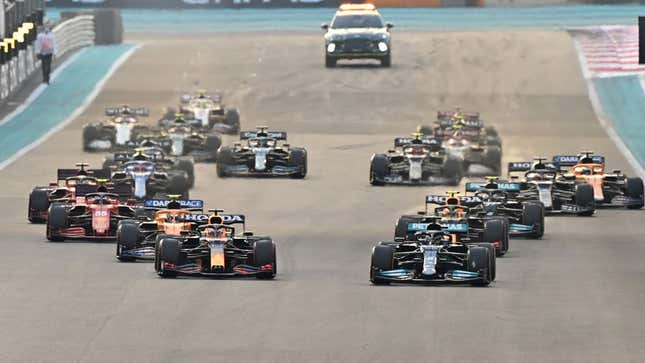
Formula 1 has always sought to tweak its regulations to keep the racing exciting. The rule changes have impacted different teams in a variety of ways, but were always done under the guise of maintaining fair, entertaining racing. But when those rules change frequently, or lack overall consistency in all-important decisions for what’s happening on-track, that’s when outcomes like Sunday’s at the Abu Dhabi Grand Prix become incredibly problematic.
In the past, changes to benefit the on-track action have included the slightly strange decision to add grooves to the tires in 1998. Regulators thought this would slow the cars, increase tire wear and therefore encourage more pit stops during the race.
A few years later, in 2011, then F1 supremo Bernie Ecclestone even had the batshit idea to fit sprinklers to race tracks in order to simulate wet races if the action was getting dull.
Then, ahead of the 2021 season, the aerodynamic regulations were altered to reduce the floor area in a move that was also said to bring about closer racing.
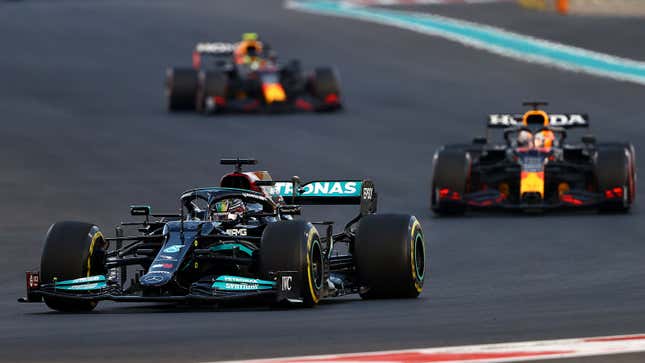
This was seen as a direct result of Mercedes dominance of the sport. And the team’s drivers, Lewis Hamilton and Valtteri Bottas, both reported issues getting a hang of the 2021 car as a result.
But, the change in rules did exactly what Formula 1 management wanted. The new regulations brought the racing pack closer together and, as such, F1 fans have been treated to one of the most exciting title battles in year.
Hamilton, the elder statesman of the sport, has faced stiff competition from 24-year-old Max Verstappen, who has spent the year chasing his first world title. While Verstappen’s team have shown improvements year on year, its ability to fight for the title are as a direct result of the squad’s grasp of the 2021 rules.
These rules were meticulously planned and thought through over months proceeding the start of the season. They were then carefully written out in F1’s sporting and technical regulations so that every team on the grid knew exactly where they stood.
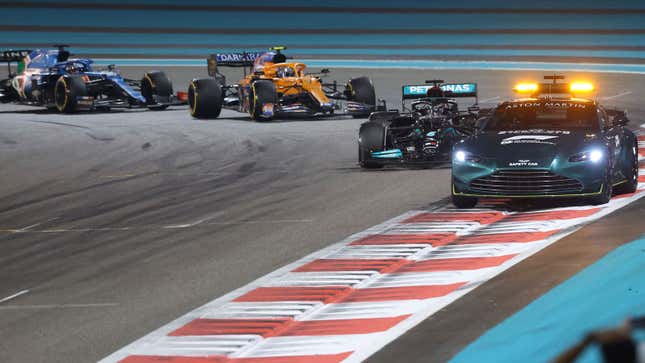
As such, the rules did exactly what they set out to, and created close on-track action at almost every race this year. And this wasn’t just at the front of the pack, where Verstappen and Hamilton were fighting.
McLaren and Ferrari had been locked in a close competition for third place in the standings all year, and Alpine, Alpha Tauri and Aston Martin were also closely matched. Heck, even Williams was fighting for points and podiums after two atrocious years for the historic team.
But, while the racing has been close, the year’s on-track action has often been outshone by the off-track decisions made by Formula 1's stewards and race director, Michael Masi.
As a result, contentious events have proven even more divisive thanks to inconsistencies in the upkeep of the sport’s regulations. Seemingly similar incidents have sometimes garnered penalties, while others have gone un-punished.
These changeable attitudes towards the rules has only escalated in recent weeks, which many onlookers have seen as a way to maintain the close battles across the grid.
In recent races, this has seen Verstappen seemingly get away with a minor punishment for colliding with his rival, and Hamilton himself went unpunished for passing off-track.
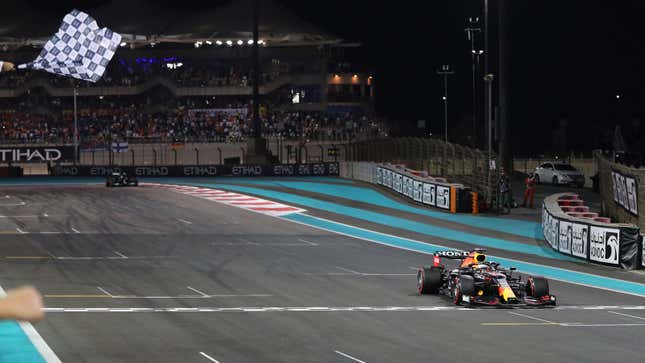
Those decisions moulded the championship into what it was going into the final race of the season, when both Hamilton and Verstappen were tied on points. But all that would have had to stop, the rules would have had to have been upheld to the letter in order to ensure a fair fight at the finale.
That isn’t what happened. Not even close.
Instead, we’ve had further inconsistencies where Hamilton wasn’t punished for going off track when forced wide by Verstappen, and we heard argumentative exchanges between both teams and the race director. It felt, at this point, like on-track drama had replaced driver safety as the priority for Formula 1 management.
This all culminated in the closing stages of the Abu Dhabi Grand Prix, when a late safety car was brought out by the crashing Nicholas Latifi. With less than 10 laps to go, the cars were bunched up behind the safety car as marshals cleared the wreck of the Williams.
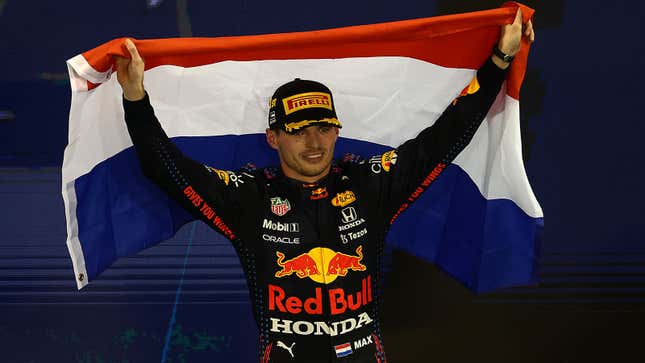
It looked to many that the race would finish under the safety car, as there seemed to be insufficient time to clear away the wreck, allow lapped cars to pass, and then safely restart the race.
But in a series of rushed decisions and directives, the five cars in between Hamilton and Verstappen were allowed to un-lap themselves and the safety car was called in with one lap left to race.
That one rushed choice has outraged fans on both sides of the title fight.
Hamilton’s followers believe he was robbed of the win and his eighth world title, while Verstappen’s followers are delighted to see their man on top, but believe he should have been allowed to prove his worth on track.
To me, it marked a total disregard for the integrity of F1. It was the same as if a tennis umpire had shouted “next point winner” when one player was two sets up. After a year of close racing, it reduced the whole championship to a gimmick.

Neither title contender deserved to lose this year’s championship, especially not in an unforeseen manner like this.
And following weeks of claims from both sides that the title should be decided on track and not in a steward’s room. It’s heartbreaking for drivers, teams and fans that this rash stewarding decision will forever linger over this fantastic year of racing.
Verstappen was a worthy champion in 2021, as was Hamilton. But in such a divisive event, every participant must be singing from the same hymn sheet, including those in charge.
As we head into a new era of F1 with sweeping changes to the sporting and technical rules once again, management must ensure this is not allowed to happen again.
Changes need to be made, or F1 risks being seen as a circus rather than the pinnacle of motor racing.